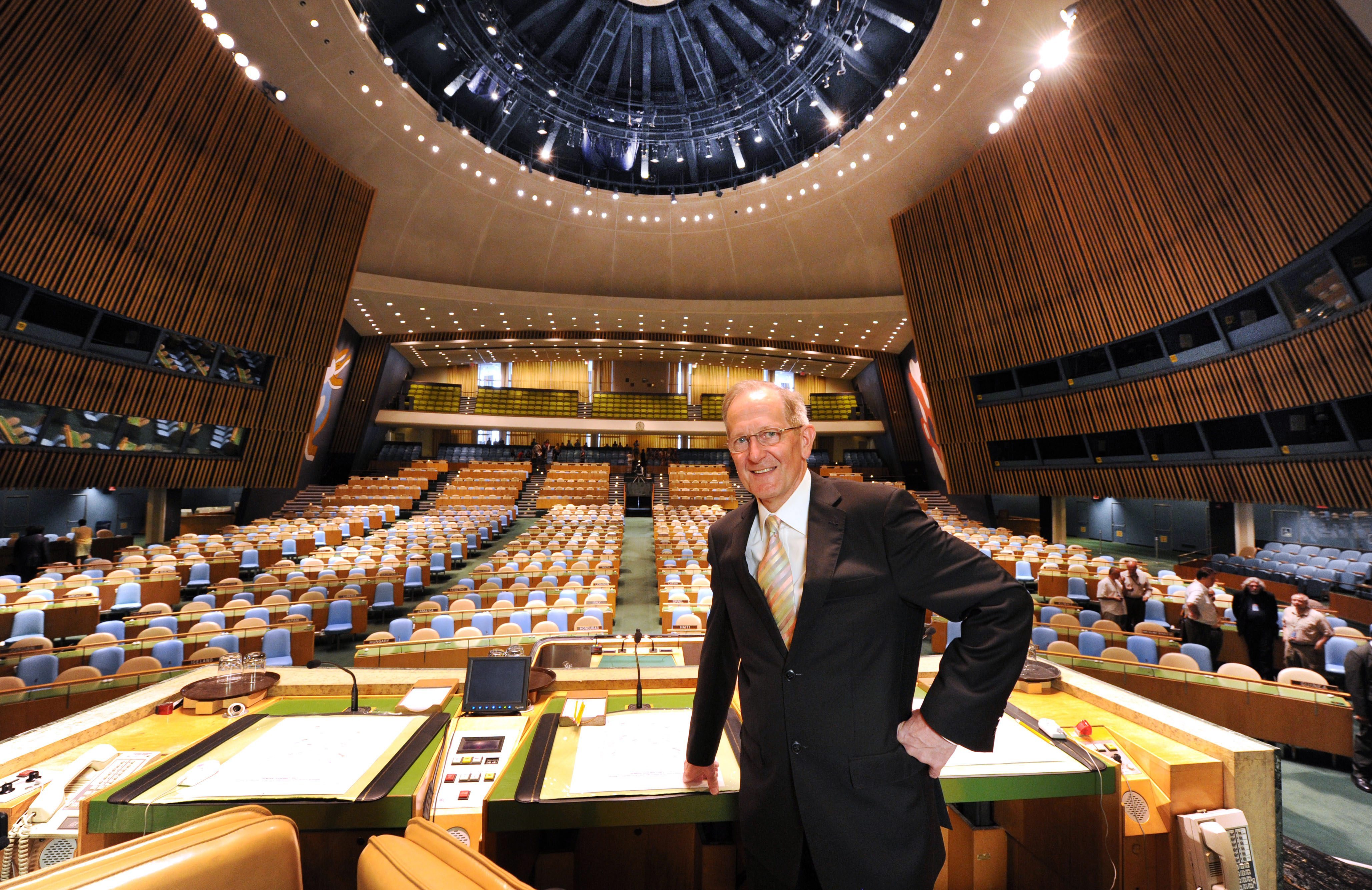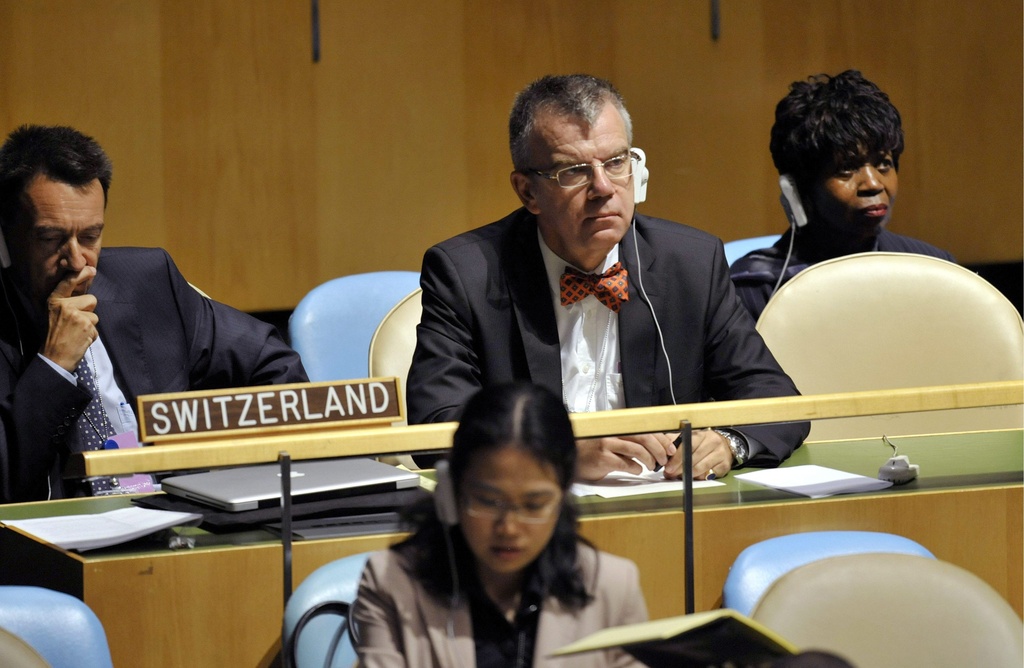Swiss president hones in on Syria, UN reforms

In a speech before the United Nations General Assembly in New York, Swiss President Eveline Widmer-Schlumpf has urged swift action against Syrian human rights violations. She also reiterated calls for reforms to the UN organisation.
Widmer-Schlumpf said Switzerland had been watching the worsening situation in Syria with great concern at the violation of human rights.
“Innocent people are dying, caught in the crossfire between the Syrian army and the armed opposition,” she said.
UN Secretary General Ban Ki-Moon began the assembly by demanding an end to the Syrian civil war, which he called “a regional catastrophe with global impacts”. He said the international community could not look away as violence spiraled out of control.
In particular, Ban urged the members of the Security Council and Arab nations to support the efforts of the Syrian envoy to the UN, Lakhdar Brahimi.
“We have to stop the violence and weapons trade from both sides and bring about a Syrian-led transition as soon as possible,” Ban said.
China and Russia have three times blocked a Security Council resolution that would implement consequences for Syrian President Bashar al-Assad. Since the protests against al-Assad’s regime began, human rights organisations estimate that more than 29,000 people have been killed.
Petitioning for justice
More than one million people have fled their homes within Syria and 250,000 have sought refuge in neighbouring countries. Gaining outside access to the conflict’s injured and traumatised victims is almost impossible, noted Widmer-Schlumpf, holder of the rotating presidency.
The Swiss president also affirmed that Switzerland had given SFr13 million ($13.8 million) to humanitarian aid efforts in Syria and neighbouring countries. As long as human rights in Syria continue to be violated in this manner without consequences, she said, there will be no security in the country.
According to Widmer-Schlumpf, Switzerland is working toward a way to bring those responsible for the extreme human rights violations in Syria to justice. “The lack of punishment is not only immoral,” she said, but it also hinders the globally accepted reconciliation process after a conflict and will lead to a repeat of the situation in Syria.
The president also appealed to the gathered countries to join a Swiss-initiated petition to the UN Security Council to bring those responsible for the situation in Syria to the International Criminal Court. So far, more than 30 countries have supported the petition.
Switzerland initiated the petition to the Security Council in July. However, before it is delivered to the Council, the Swiss would like the support of at least 50 countries, Foreign Minister Didier Burkhalter told the media on Monday in New York.
Widmer-Schlumpf also praised the work of the UN Special Commission for Syria, which was founded by the UN Human Rights Council in Geneva, and urged that it be strengthened.
The Swiss delegation also recommended that human rights attorney Carla del Ponte, who served on the International Criminal Tribunal for the former Yugoslavia, be appointed to the Syrian special commission. Widmer-Schlumpf and Burkhalter told a press conference that a decision on del Ponte’s appointment was expected soon.
Reforms and security
During its ten years of UN membership, Switzerland has been active in encouraging reforms of UN institutions and advocating for human rights issues. In her speech, Widmer-Schlumpf urged that the reform projects of the UN Secretary General be implemented as soon as possible.
Those reforms would help the UN find solutions to conflicts instead of blocking resolutions. Many critics find that the permanent Security Council members’ veto powers should be adjusted in cases of human rights violations or war crimes.
Widmer-Schlumpf also encouraged the UN to continue to develop its mediation and conflict prevention abilities. She noted that over the past ten years, Switzerland has been an active part of around 30 mediation sessions in about 20 countries.
Deviating from her planned speech, Widmer-Schlumpf also brought up the issue of freedom of expression, as did US President Barack Obama before her.
Obama condemned the recent attacks on US embassies sparked by a “crude and disgusting” film involving the Islamic prophet Mohammed as attacks against the US as well as attacks on the UN’s principles and core values.
Obama spoke out for more tolerance and underlined the importance of the freedoms of speech and expression.
Widmer-Schlumpf explained before the press that she also places great stock in those freedoms.
“I think freedom of speech is essential to a free country,” she said. “There are incidents where it leads to violence, but at the same time, the right to speak freely cannot be suppressed through violent methods.”
Swiss President Eveline Widmer-Schlumpf met her Egyptian counterpart
Mohammed Morsi on Tuesday on the sidelines of the UN General Assembly meeting in New York.
The Swiss president reaffirmed Switzerland’s support to Egypt during the democratic transitional period.
Discussions also focused on democratic and judicial progress and funds blocked in Switzerland belonging to former president Hosni Mubarak and his entourage.
On February 11, 2011, Switzerland froze $410 million in assets belonging to Hosni Mubarak and members of his immediate entourage. A further $290 million belonging to members of the regime has since been identified and frozen.
Widmer-Schlumpf said Switzerland was interested to return to Egypt any illegal funds as quickly as possible. Close collaboration with the Egyptian authorities was crucial, she added.
(Translated from German by Veronica DeVore)

In compliance with the JTI standards
More: SWI swissinfo.ch certified by the Journalism Trust Initiative













You can find an overview of ongoing debates with our journalists here . Please join us!
If you want to start a conversation about a topic raised in this article or want to report factual errors, email us at english@swissinfo.ch.